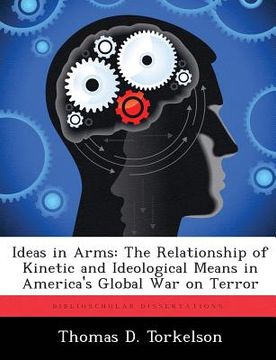Share
Ideas in Arms: The Relationship of Kinetic and Ideological Means in America's Global War on Terror (in English)
Thomas D. Torkelson
(Author)
·
Biblioscholar
· Paperback
Ideas in Arms: The Relationship of Kinetic and Ideological Means in America's Global War on Terror (in English) - Torkelson, Thomas D.
$ 48.80
$ 57.95
You save: $ 9.15
Choose the list to add your product or create one New List
✓ Product added successfully to the Wishlist.
Go to My WishlistsIt will be shipped from our warehouse between
Thursday, July 18 and
Friday, July 19.
You will receive it anywhere in United States between 1 and 3 business days after shipment.
Synopsis "Ideas in Arms: The Relationship of Kinetic and Ideological Means in America's Global War on Terror (in English)"
The inability of the US to achieve its stated political objectives in its Global War on Terror (GWOT) suggests its kinetic-centric military strategy is flawed. This study erects a framework of effectiveness utilizing Clausewitzian principles to judge military strategy. By determining the expressed political objectives of GWOT, the centers of gravity (COGs) that military strategy should target within this struggle, and considering GWOT's placement along a Clausewitzian continuum of violence, this study evaluates US military efforts in Operation Enduring Freedom (OEF) through the perspective of two opposing models. First, the study presents a kinetic model founded in America's historical implementation of its military arm that emphasizes physical effects. Second, the paper constructs a non-kinetic model comprised of the primarily psychological components of the nation's informational capabilities. Examining actions in OEF through these two lenses reveals the institutional tension the US military experienced as it sought to leverage the relevant COG. Stemming from the preeminence of ideology among the COGs of GWOT, the study finds that the US military and civilian leadership came to recognize the detrimental effects of its continued emphasis upon kinetic means in OEF. As a thesis and anti-thesis conflict in a Hegelian, dialectic fashion, the US military arrived at a synthesis for its operations in Afghanistan. Acknowledging the need to elevate non-kinetic campaigns as the primary effort in OEF, US military operations began to stress actions directed at the COG of ideology. Although the ultimate outcome of GWOT remains to be determined, positive institutional experiences such as the Provincial Reconstruction Team (PRT) concept need to be preserved, while significant national public diplomacy reform must occur.
- 0% (0)
- 0% (0)
- 0% (0)
- 0% (0)
- 0% (0)
All books in our catalog are Original.
The book is written in English.
The binding of this edition is Paperback.
✓ Producto agregado correctamente al carro, Ir a Pagar.

